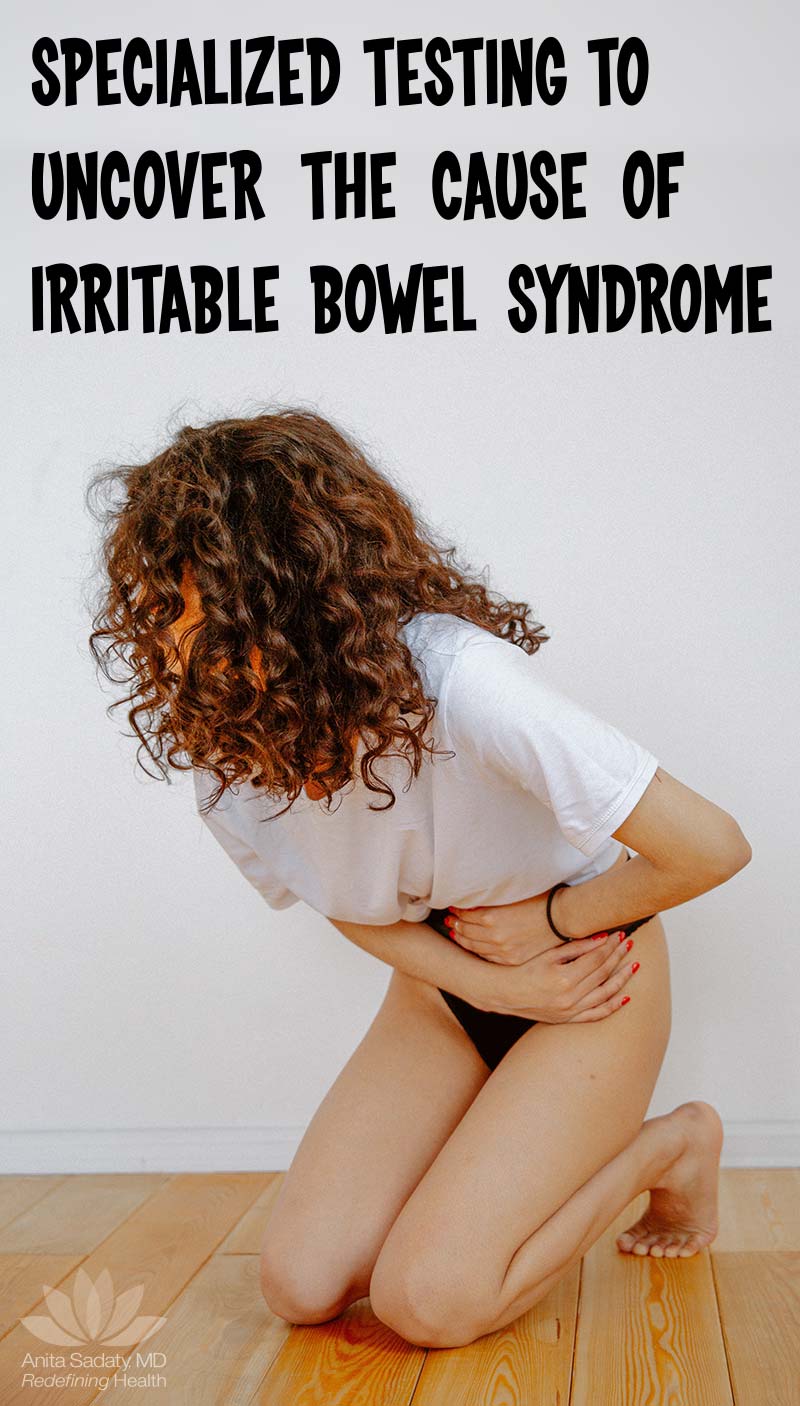
Gut Health Part 2:
How you can use specialized testing to uncover the cause of your IBS
In Part 1 of our Gut Health Series, we discussed how food intolerances and sensitivities might be behind your stomach problems. But that’s not the only thing to consider when checking out your gut health. IBS or irritable bowel syndrome is probably the most common gastrointestinal condition affecting between 10% and 15% of people in the United States and around the world. It specifically impacts all the males in my household as they can’t seem to contain gaseous emissions.Classic Symptoms Of IBS:
- Abdominal pain and cramping
- Gas and bloating
- Changes in bowel movements including constipation, diarrhea or alternating between one and the other
- Food intolerances
- Anxiety and Depression
How is it diagnosed?
IBS is thought to be a diagnosis of exclusion. Meaning, once your physician excludes other reasons for inflammatory bowel symptoms, like Celiac disease, parasitic or bacterial infections, autoimmune conditions like Crohn’s disease or Ulcerative colitis and other conditions diagnosed with conventional stool samples and colonoscopy or endoscopy testing, you are left with the diagnosis of IBS. IBS is unfortunately seen by many gastroenterologists as a condition of either unknown cause or caused by stress or anxiety. Current research demonstrates that small intestinal bacterial overgrowth or intestinal methanogen overgrowth are a major causes of IBS, up to 80% of the time, and can be diagnosed with specialized breath tests. Dr. Pimental, a researcher investigating the causes of IBS, believes that autoimmunity following an episode of food poisoning can adversely affect normal intestinal movement or motility. These auto-antibodies damage the intestinal complex needed to maintain motility and gut health. This autoimmune injury sets you up for IBS as the self cleaning waves of intestinal motion that move things (like harmful toxins, bacteria and other microorganisms) gets stalled. This allows harmful bacteria to build up in places they shouldn’t be (like your small intestine). Once these bacteria take hold, they can start misbehaving and causing intestinal issues like IBS.What’s a Breath Test?
First, a little about the small intestine. The small intestine is the part of your gut located just beyond your stomach. It is generally a fairly sterile environment whose job it is to help digest and internalize nutrients and vitamins. The colon or large intestine is the “tail end” of the gut where you house your beneficial bacteria. Those beneficial bacteria take on general housekeeping doodies, like paying the bills, watching Netflix, and maybe even mowing the lawn. Anyway, that’s where you are supposed to have bacteria.
If things go sideways and the small intestine starts to get overgrown with some not so healthy bacteria (like E. Coli and Klebsiella), they start actually consuming the food we are supposed to be absorbing. They ferment our food and release, you guessed it, GAS. Hence the bloat, indigestion, heartburn and eventually constipation and or diarrhea. VERY sexy.
There are two breath tests available to diagnose this condition: The Lactulose breath test and the Trio Breath test. The Lactulose breath test measures two gasses, hydrogen and methane. These represent a majority of the fermented gasses released by small intestinal bacteria. The Trio Breath test measures a third type of gas called hydrogen sulfide.
This test will tell you if gasses are accumulating in the small intestine and whether or not SIBO (small intestinal overgrowth) or IMO (intestinal methanogen overgrowth) is causing your irritable bowel syndrome.

What if your symptoms are not related to SIBO?
Excellent question! Although it would be nice to think SIBO or IMO are always the cause of IBS, there are other reasons for intestinal upset. I find that for some reason most gastroenterologists don’t really order stool tests that check the microbiology of the gut. Part of the reason is because standard lab testing for stool samples are totally inadequate and often useless. That’s where advanced diagnostic stool testing comes in. I use the GI MAP test by Diagnostic Solutions. According to the company:“…Research indicates that gut health impacts overall health. The gut microbiome plays a critical role in…health, including digestive, immune, metabolic and neuroendocrine functions. Assessing GI health with the proper tools can help practitioners get to the root cause of chronic illness. The GI-MAP (Microbial Assay Plus) is unique in the field of comprehensive stool testing. It relies exclusively on quantitative polymerase chain reaction (qPCR) technology to detect parasites, bacteria, fungi, and more, by targeting the specific DNA of the organisms tested.”
Sounds super fancy and sciency doesn’t it? It MUST be good! Check out this sample report and all the things it can identify. I use the GI MAP in conjunction with breath testing to help crack difficult gut cases. This allows me to get a more accurate view of what is going on along the entire intestinal tract and to help identify what imbalances are at play.
Should I get a GI MAP test?
Almost every patient can benefit from a GI-MAP gut health assessment. Some patients are looking to achieve optimal health, while other patients have been chronically ill and frustrated without a diagnosis for years.Some conditions that warrant testing are:
- Autoimmune diseases
- IBS/IBD
- Digestive complaints, diarrhea or constipation
- Brain fog
- Skin problems, like acne and psoriasis
- Mood disorders, depression, and anxiety
- Diabetes and weight loss issues